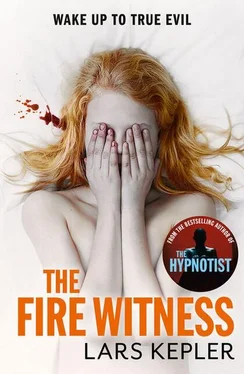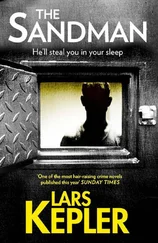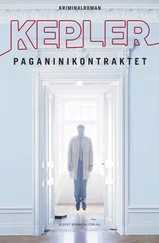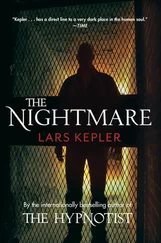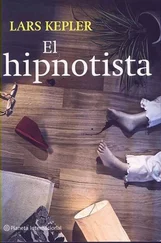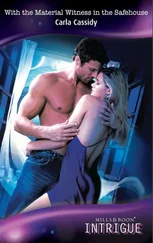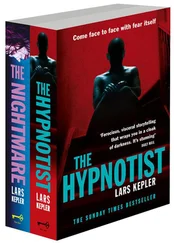Meanwhile, Joona observes Susanne Öst speak on the cell phone and then cast him a glance via her rearview mirror. A second later, his cell phone rings. Susanne tells him they now only have one address left to check. It’s not far from where they are, and it should take ten minutes to get there.
Finally she slows down and Joona follows her as she turns onto a road between two waterlogged fields and drives up to a yellow wooden house. Its blinds are drawn. Apple trees are growing in a well-tended yard and a blue-and-white-striped hammock hangs between two of them. They park their cars and walk toward two police offers standing by a squad car.
Joona greets the officers and then studies the house. He says, “We don’t know if Vicky took the car in order to steal the child, or if she just wanted a car and the child happened to be in the backseat. At the moment, we must think of the child as a hostage.”
“A hostage,” the prosecutor repeats in a low voice.
She walks up to the door and rings the bell. No response. She shouts a warning that the police will break down the door if they are not let inside. There’s someone inside. A piece of heavy furniture is being moved. She can hear the floor groan as the piece is turned over.
“I’ll go in,” Joona says.
One of the policemen stays to watch the front of the house and the garage. The other follows Joona around the rear. The back of the house has a small set of concrete steps up to a back door with a window of frosted glass. Joona kicks the door, the window breaks and shards of glass fall onto a blue doormat.
“Stay here,” he tells the policeman, and he slips inside.
The slivers of glass crunch under Joona’s shoes as he enters a neat laundry room complete with a hand-crank mangle fastened to a sink.
Miranda was sitting in a chair when she was killed , Joona thinks. Elisabet, wearing only socks on her feet, was hunted across the yard and into the brewery. She tried to crawl away but was beaten to death.
Joona can feel the weight of his new pistol in its holster underneath his arm. It’s a semiautomatic Smith & Wesson .45 caliber ACP. It weighs slightly more than his previous one and carries fewer bullets, but its first shot is quicker.
Joona slowly opens a creaky door and finds himself looking into a traditional Swedish country kitchen. A large ceramic bowl with apples is on the round wooden table and there’s the scent of a fire burning in the beautiful old wood-fired stove. He sees frozen cinnamon buns thawing on a tray and a drawer with sharp knives has been left open. He catches a glimpse of the yard between the drawn curtains.
He shuts the door and walks down the hall. He stops when he hears the sound of tinkling from the ceiling lamp. Its glass prisms are swaying and colliding. Someone is upstairs.
Hugging the wall, he climbs the stairs. Between the open treads he can see clothes hanging in neat rows beneath the staircase. When he reaches the landing, he creeps silently to the closest bedroom. There’s a double bed covered by a crazy quilt and a wardrobe, its sliding door partially open. The curtains are closed and the ceiling light is off. Joona steps into the room, his line of fire clear, and moves to the side. The front sight of a rifle is lying on the bed.
He hears someone breathing close-by. Joona aims his gun at the corner of the room as he steps farther inside. Beside the wardrobe, there’s a man with stooped shoulders and light brown hair. He’s staring at Joona. He’s barefoot and wearing dark blue jeans and a white T-shirt with the words “Stora Enso.” He’s hiding something behind his back and is slowly moving toward the center of the room and closer to the bed.
“I’m from the National Police,” Joona says. He lowers his gun slightly.
“This is my house,” the man says.
“You should have opened the door.”
Joona sees that sweat is running down the man’s face.
“Did you bust my back door?”
“I’m afraid so.”
“Can it be fixed?”
“I’m afraid not.”
Something glints in the smoke-tinted mirror on the wardrobe door. Joona sees in the reflection that the man is holding a large kitchen knife behind his back.
He says calmly, “I need to see what’s in your garage.”
“The only thing there is my car.”
“Put the knife on the bed and take me to your garage.”
The man moves the knife and looks at it. It has a stained wooden shaft, and the blade has been worn down by sharpening.
“I don’t have time to wait,” Joona says.
“You shouldn’t have broken my—”
Joona hears bare feet moving in his direction. He moves slightly to the side while keeping his eyes on the knife. A shadow is heading for his back. Joona turns his body and puts his energy into lifting his elbow to meet the rushing shadow.
Joona’s gun is still aimed at the man with the knife as his elbow hits a boy in the middle of his chest, knocking the wind out of him. The boy tries to stay upright, but he falls to the floor, gasping for breath. He pulls himself into a fetal position on his side, the rag rug rucked up beneath him.
“They’re from Afghanistan,” the man says. “They needed help.”
“I am going to shoot you in the leg if you don’t throw the knife on the bed right now,” Joona says.
The man glances down at the knife in his hand, then throws it on the bed.
Two small children appear at the door. Transfixed, they stare at Joona.
“You’re hiding refugees?” Joona asks. “How much do they pay you?”
“You think I can change them?” the man says indignantly.
“Do you?”
“No, I don’t.”
Joona looks at the dark-eyed boy. He asks in English, “Do you pay him?”
The boy shakes his head.
“No human being is illegal,” the man says in Swedish.
“You don’t have to be afraid,” Joona says to the boy, still in English. “I promise I will help you. Are you being abused?”
“Dennis is a good man,” the boy whispers.
“I’m happy to hear that,” Joona says. He looks the man in the eye then leaves the room.
He walks down the stairs and out the back door. He heads to the garage. He stands there looking through the window at a dusty old Saab inside. He’s thinking that Vicky and the boy, Dante, are still missing and there are not many more places to look.
Flora Hansen is mopping the floor in the hall of Ewa and Hans-Gunnar’s second-floor apartment. Her left cheek is still burning from the blow and her ear is ringing. The shine was rubbed off the vinyl long ago, but the water makes it glisten again for a short time.
Flora has beaten all the rugs and mopped the living room, the narrow kitchen, and Hans-Gunnar’s room, but she’s waiting to do Ewa’s until Solsidan starts. Both Ewa and Hans-Gunnar are fans of the show and never miss an episode.
Flora shoves the mop into every crevice and corner. Walking backward, she bumps against a picture she made at nursery school more than thirty years ago. All the children glued pasta to a wooden board and then sprayed their pictures with gold paint. She hears the theme music of the TV show start. Now is her chance.
Her back twinges as she lifts the bucket and carries it into Ewa’s room. She closes the door behind her and blocks it with the bucket so that no one can fling the door open. Her heart starts to pound as she dips the mop into the bucket, presses out the excess water, and glances at the wedding photo on the nightstand. Ewa has hooked the key to her desk on the back of the photograph.
Flora does all the housework in exchange for a place to stay. She’d had no choice but to return to Ewa and Hans-Gunnar after she lost her job as an assistant nurse at Saint Göran’s Hospital and her unemployment ran out. She lives in the maid’s room.
Читать дальше
